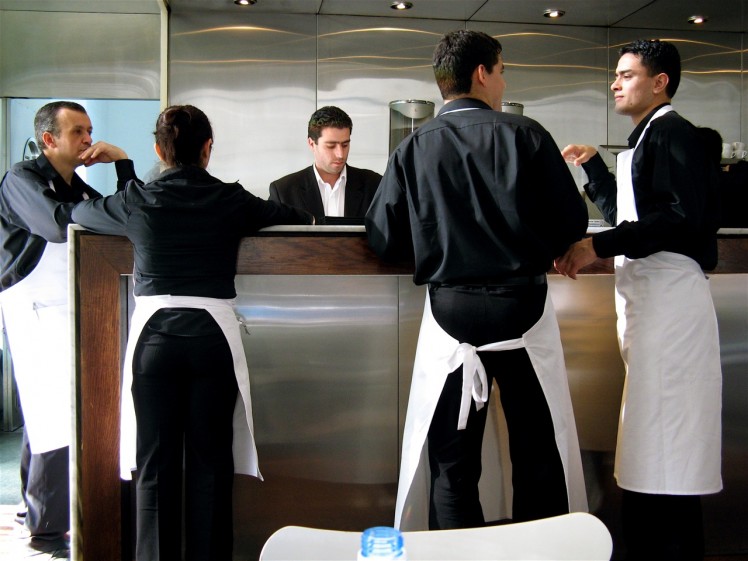
Photo credit: sarah0s / Foter / CC BY-NC-ND
Restaurant patrons in Malaysia recently notched a big win as the government laid down the law with regard to the ever-controversial service charge. Editor Chad Merchant revisits this topic once more, now with newfound optimism.
Though I’m quite sure my recent column had nothing to do with it, the Malaysian government has nevertheless notched a meaningful victory for consumers with regard to the dubious service charge levied by restaurants and hotels. As I wrote last month, paying a service charge – particularly when I get reasonably good service – doesn’t bother me in the least. The problem arises when dishonest business owners pocket that extra 10% rather than distributing it to their often underpaid-to-begin-with service staff. And I know from anecdotal evidence that happens plenty. Now, however, it seems we’ll be able to say it happened plenty.
The government announced shortly after the GST programme was kicked off that, with immediate effect, restaurants and hotels are now no longer allowed to impose service charge unless they have employer-employee collective agreements in place. This presumably ensures that the service charge funds are distributed in the spirit and manner in which they are collected.
Domestic Trade, Cooperative and Consumerism Ministry secretary-general Datuk Seri Alias Ahmad said restaurants were required to display a notice if they want to impose service charges. Indeed, when I went out to eat with a group of friends a couple of nights ago, there was a prominent sign on a stand at the entrance notifying patrons of the service charge at the restaurant.
To me, that’s good on a couple of fronts: first, having more information as a consumer is nearly always a preferable option, as it allows us to make an informed decision. Second, that bold notice sets an expectation. You know from the start – and restaurant management and its workers know that you know – there will be a 10% service charge levied. So that might just drive the quality of the service up, too. Hopefully.
Datuk Alias agrees, saying, “It is important for consumers to know why they are subjected to service charge and also to know what sort of service they are getting.”
I had long maintained that paying the 10% service charge wasn’t really the problem, it was the haphazard manner in which it was collected (and usually retained) by the restaurant. Think of it in the grossest terms of human nature: if a restaurant pulls in RM9, 000 a day – a paltry sum in a busy, midrange restaurant – and is open every day, that’s around RM270, 000 in gross revenue per month. Super busy restaurants, or the high-end ones, pull in considerably more than that. But just use that figure. That’s RM27, 000 in service charges. Of course, some restaurant owners – those with integrity – indeed distributed those funds to their staff. But then, there are others, who look at that RM27, 000 and think, “You know, all those ringgits would be much more comfortable in my bank account.”
Though it’s encouraging that the Malaysian government has done right by the people, and beyond question that consumers will benefit from this new regulation, it seems much of it was prompted by confusion about the service charge once the GST programme was implemented. Comments I’ve read on various stories about the service charge seem to bear this out – many Malaysians don’t understand that the service charge doesn’t have anything whatsoever to do with tax, nor did it ever. Many customers had apparently refused to pay the service charge once GST was imposed, which is baffling since there had always been a government tax levied anyway (at least in restaurants that served alcohol or had a certain level of annual sales). But GST, which is imposed on all restaurants now, seemed to be the catalyst here, and the lack of understanding about service charges prompted renewed discussion, and in my opinion, the government made the right call. It protects consumers, and it protects restaurant and hotel service staff.
It seems some restaurants, rather than fairly pay the service charge to their staff, are simply eliminating it to be in compliance with the new rules, and raising their menu prices. Though this is unfortunate for the staff, it’s good for the consumers – again, on two fronts. First, yet again, it helps diners make an informed decision based on the real price of eating out. No longer is the true cost of the meal masked by the “hidden” service charge when you don’t know about until you get your bill (though to be fair, many restaurants did put this information on their menus). Second, if your regular eatery which always imposed a service charge has suddenly done away with it and raised their menu prices, that at the very least suggests an unscrupulous owner who was pocketing that service charge.
All too often, governments – in any country – are maligned for ignoring or marginalizing the needs of the people which they are presumably in place to serve. It’s obvious to anyone living here that recently, Malaysia’s government has faced an extraordinary number of challenges and crises and has come under fire from nearly all sides. But in this case, at the very least, they got it right and scored one for the people. And that, folks, is how you really serve the customer!
Read This: Service Charge in Malaysian Restaurants
"ExpatGo welcomes and encourages comments, input, and divergent opinions. However, we kindly request that you use suitable language in your comments, and refrain from any sort of personal attack, hate speech, or disparaging rhetoric. Comments not in line with this are subject to removal from the site. "



















Rotiboy no service charge.
I refused to pay the service charge at TGI Fridays at Sunway Lagoon on Thursday. The service was terrible. Three drinks were missing from our order. Then only two of the four children’s meals we ordered arrived. The other two arrived after everyone else had finished and only after we asked twice where the meals were. One of the four adult meals we ordered arrived 15 minutes after the others and the starter we ordered came 10 minutes after the first three mains.
I’ll happily pay 10% and more for good service but people should not be forced to pay for bad service.
oh boy, why do I feel that a big can of worms has been opened here, “cos I guarantee that we’ll be hit with both a lot of times and with that we’ll get in unpleasant situations.especially expats as the local populations thinks that money grows on our backs and we water these money-plants when we’re taking a shower!
Hi All, Let’s share which restaurant impose Service Charge, GST or both together. So we have a choice to choose.
http://check-service-charge.herokuapp.com/